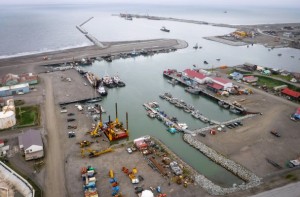
The Arctic has been a hot topic lately. The region has the subject of countless conferences around the world, many of which also address issues of climate change and sustainability. But another focus of Arctic discussions has been development.
To promote the development of a deep draft Arctic port in Nome, the city recently sent a delegation to Seattle for an Arctic conference and then onto meetings in Washington, D.C.
The delegation consisted of Nome’s Mayor Richard Beneville, Port Director Joy Baker, and Port Commissioner Megan Alvanna-Stimpfle. Their first stop was Seattle for the third annual Arctic Encounter Symposium. The event brought together Coast Guard officials, NASA scientists, industry representatives, and delegates from across Alaska.
Baker presented in one of the first sessions on shipping, commerce, and transportation in the Far North. Along with reiterating the rise in vessel traffic through the Arctic, Baker also pointed to a similar trend at Nome’s port. Alvanna-Stimpfle attended the session and said Baker’s message was a surprise to many.
“A lot of folks outside of Nome don’t realize how busy our port is,” Alvanna-Stimpfle said, “so she shed light on the amount of research vessels and tourist vessels [Nome’s port receives], and how active our port is today.”
She called it an “eye-opening presentation,” even for the Alaskans in the room, many of whom, she said, were unaware how much traffic Nome’s port sees each summer.
On the conference’s second day, Baker took part in a breakout session addressing the challenges and opportunities facing Arctic port development. In it, she hit home the need for a deep draft port in Nome: not just to serve the rise in vessel traffic, but also for national security purposes.
That emphasis on Nome’s strategic importance was also the focus of meetings the following week in Washington, D.C.
Alvanna-Stimpfle traveled with Beneville and Baker to the nation’s capital and explained that they were there to urge the U.S. Army Corps of Engineers to continue with the Arctic Deep Draft Port Study.
The Corps abandoned that study last fall, after Shell cancelled their drilling efforts in the Chukchi Sea. While that had many in Nome worried about the port’s future, at the most recent City Council meeting, Mayor Beneville said his experience left him feeling optimistic.
“The Arctic is all on the tip of everybody’s tongue, and that was very exciting. No matter what office we went to, there was tremendous excitement and urgency about it,” Beneville said.
Along with discussing the port study with the Corps, the group also met with the Office of Management and Budget, the White House’s top Arctic Official, Mark Brzezinski, the Coast Guard, the Committee for Marine Transportation Systems, and the Congressional Committees of Jurisdiction. Beneville said their meeting with Brzezinski from the White House was especially encouraging. According to Beneville, Brzezinksi said the momentum is there for a deep draft port in Nome.
And Alvanna-Stimpfle couldn’t agree more.
She said she could sense the stars aligning for Nome’s port. And if their trips to Seattle and Washington, D.C., weren’t emphasis enough, she said a certain call to Nome’s port next summer might just do the trick.
“You know, we’re expecting a 1,500-passenger vessel next year, so that will surely change the paradigm of what’s to be expected, and we need to be ready.”
The Crystal Serenity will stop in Nome next August on its way up through the once-fabled and highly elusive Northwest Passage.
Emily Russell is the voice of Alaska morning news as Alaska Public Media’s Morning News Host and Producer.
Originally from the Adirondacks in upstate New York, Emily moved to Alaska in 2012. She skied her way through three winters in Fairbanks, earning her Master’s degree in Northern Studies from UAF.
Emily’s career in radio started in Nome in 2015, reporting for KNOM on everything from subsistence whale harvests to housing shortages in Native villages. She then worked for KCAW in Sitka, finally seeing what all the fuss with Southeast, Alaska was all about.
Back on the road system, Emily is looking forward to driving her Subaru around the region to hike, hunt, fish and pick as many berries as possible. When she’s not talking into the mic in the morning, Emily can be found reporting from the peaks above Anchorage to the rivers around Southcentral.




